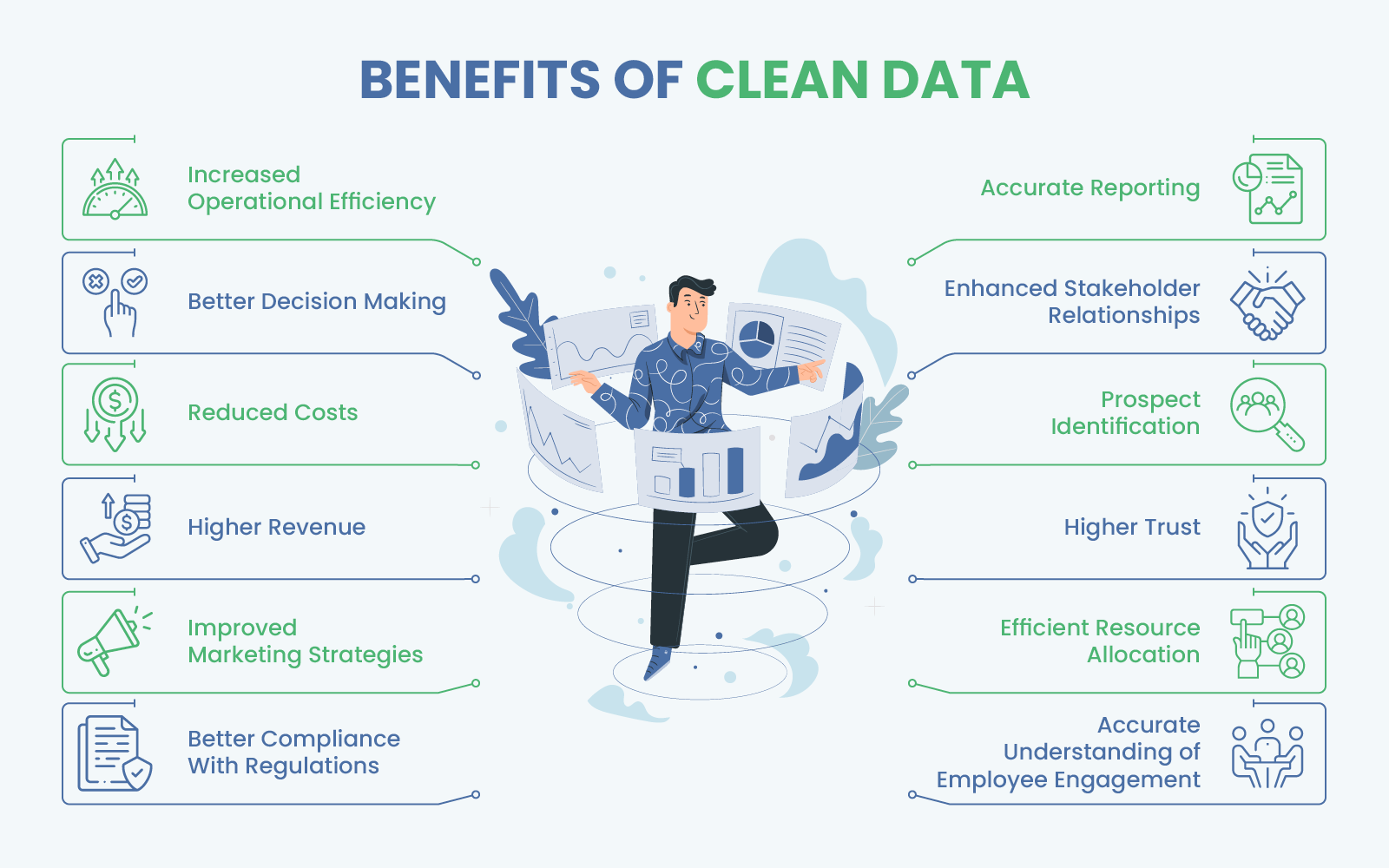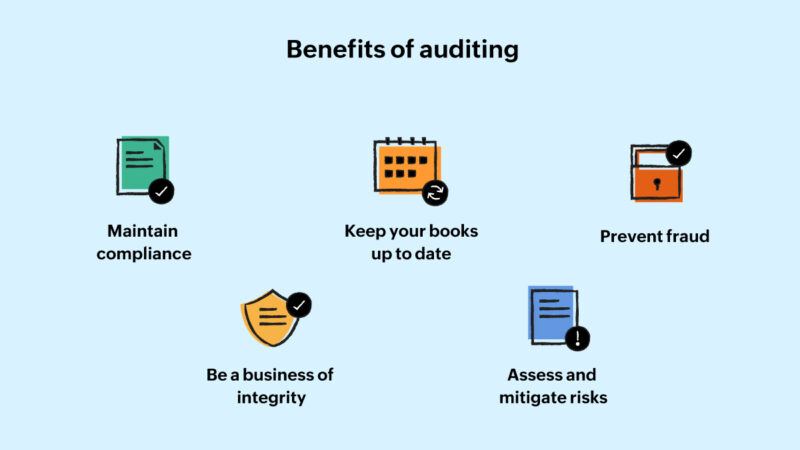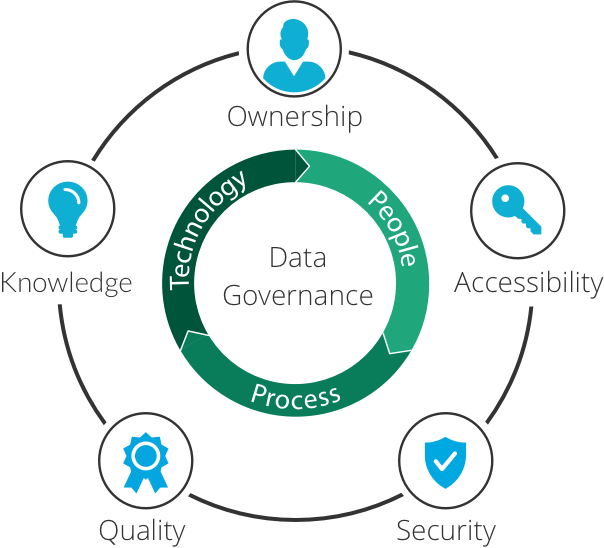Accurate data about their clients is crucial to professional service firms for smooth operations and decision-making. Good CRM data hygiene practices involve keeping the data clean, organized, and valid. Effective CRM maintenance strategies enhance efficiency and improve relationships with clients. This article explores the top five best data hygiene practices that every firm should adopt to ensure data integrity and optimize their CRM systems.
A recent survey found that 78% of professional service firms saw a significant improvement in customer satisfaction after implementing data hygiene practices. Furthermore, 84% reported enhanced CRM efficiency due to regular data cleaning, while 70% of firms noted a reduction in operational errors related to data inaccuracies. These reviews highlight the importance of data integrity for improving both internal processes and client interactions.
Benefits of CRM data hygiene
Adopting CRM data hygiene practices provides several key benefits for professional service firms, including:

- Improved client data accuracy: Improves the timeliness of all updates made on the client’s profile, enhancing decision-making.
- Enhanced CRM efficiency: A clean CRM helps the team work faster as it provides faster access to accurate information.
- Reduction in data duplication: Redundant data confuses the users and is likely to lead to errors in data analysis. Of course, all these problems are solved through regular cleanup.
- Better lead management: Managing leads with organized data leads to higher levels of conversion.
- Stronger data integrity: Helps maintain its data dependable and trustworthy enough for decisions and reporting.
1. Regular data audits
It is extremely important to carry out regular data audits to check the health of your CRM system.
Why audits are necessary
Professional service firms have the potential to suffer from data decay, which may be realized when there are no consistent audit practices. Lack of proper information or often stale information hinders the company’s performance in terms of organization and relation with their clients. Such problems are prevented through ordinary auditing procedures.

Best practices for CRM audits
- Set audit schedules: Conduct data audits on a periodic basis, say, every three or six months.
- Identify duplicates: You want to use CRM applications that detect possible dubs for review.
- Validate contact information: See to it that the client’s phone numbers, address, and mail are current.
- Check for data completeness: Check that no important data of the client is left unfilled in the fields concerning the contract.
By implementing regular audits, firms can ensure that their CRM data remains accurate and useful.
2. Implementing data validation techniques
Data validation helps to check that newly entered data in the CRM system will have a set standard of accuracy.
The importance of data validation
Data validation assists in avoiding the entry of half-baked or wrong data into your CRM. When data is not validated, wrong information can pile up in no time and the organization’s operations will be affected and its decisions impaired.
Effective data validation techniques

- Real-time validation: Apply immediate check that alerts of error occurrence during data entry. This reduces the chances of the system being flooded with wrong information.
- Automated data checks: In order to detect immediate changes in the content, new data is to be compared to the existing information with the help of automated tools.
- Validation rules: Within the CRM, it is possible to specify special requirements for data format, for example, for the fields of e-mail or phone numbers.
These techniques help maintain a high standard of data accuracy, ensuring the CRM remains a reliable resource for the firm.
3. Remove duplicate data entries
Redundancies are perhaps the most universal problem facing CRM systems today.
Impact of duplicate data
The repeated creation of profiles leads to a team’s misunderstanding as well as interruptions in communication with a client. They can also cause incorrect sales reporting and missed sales. One of the key aspects of CRM maintenance is the elimination of unnecessary double records.
How to manage data duplication
- Automated duplicate detection: As a matter of fact, most CRM systems come with features that can identify and automatically consolidate similar contacts.
- Manual review of key fields: For regular data entries, you can use the auto or drag-drop search function but for more complex entries such as client profile, look at the fields for name, email, and company, to avoid duplication.
- Establish data entry protocols: Avoid duplicate creation through proper guidelines in every organization submitting data to the program.
By minimizing duplicates, firms can ensure that their CRM data remains clear and usable, leading to better client interactions.
4. Set up data governance policies
Data governance refers to the specification of formal practices that are detailed within the implementation of your CRM system.
Why data governance is essential
One benefit of fact having good governance policies is that all parties have to adhere to some standard procedures when dealing with data in the particular organization. This minimizes data disparities and helps improve the standard of the data collected.

Creating a data governance framework
- Assign data ownership: Make some people on the team responsible for particular aspects of data management to make them more responsible.
- Establish standard operating procedures (SOPs): specify rules that the data coming in must meet, for instance, abbreviations or file names.
- Monitor data quality: Daily, and weekly, based on the key findings, review data quality reports against the governance policies.
With a strong governance framework in place, professional service firms can maintain high levels of data quality and consistency.
5. Automate CRM maintenance
This paper has justified the use of automation in the upkeep of clean CRM data without having to engage the process manually.
Benefits of automation
Automating routine CRM maintenance tasks helps reduce human error and saves time. It also ensures that data is consistently cleaned and validated without the need for constant oversight.
Automation strategies for CRM maintenance
- Automated data cleaning: To accomplish this, incorporate the use of automated tools on a recurring basis to erase duplicate records and obsolete data from your CRM.
- Scheduled data audits: Schedule routine audit checks that are programmable and flag off any disparities or poor standards.
- Lead scoring automation: To efficiently manage the leads you need to automate the lead scoring process to identify high-quality leads.
By leveraging automation, firms can ensure that their CRM remains optimized and free of clutter, allowing teams to focus on higher-value tasks.
Additional insights for CRM data hygiene
In addition to the top five practices, professional service firms should consider implementing the following for improved CRM data hygiene:
Continuous training for staff
To have proper CRM hygiene you need to start with your team. Ongoing training helps the organization to remind all the employees of how they should enter and process data correctly.
Training focus areas
- Data entry best practices: Instruct the members of the teaching team on the proper way of entering data preferably accurately and with high consistency.
- CRM tools usage: Ensure that the customers undergo training in how to clean the CRM tools for data collection and validation.
- Reporting and analytics: Explain to the employees how clean data enhances reporting and crediting hence making the right decisions.
Continuous training helps ensure long-term data quality and optimal CRM performance. Ready to take your business to the next level with improved ROI and CRM Data Cleanup? Contact us for a free consultation or explore our CRM Cleanup services to see how we can help.
Conclusion
Clean CRM data is efficient and reliable data, supportive of your business goals. A professional service firm that makes use of periodic, audits, validation techniques, and automated maintenance goes a long way in making its CRM operate far more effectively than otherwise would have been the case. Governance policies ensure that consistency in data is maintained, while duplicate management of data maintains accuracy in the same. By focusing on these top-five CRM data hygiene best practices, firms can enhance quality, build better client relationships, and promote efficiency across an organization. Other long-term benefits will be improved decision-making, better lead management, and smoother workflow within the CRM System.





